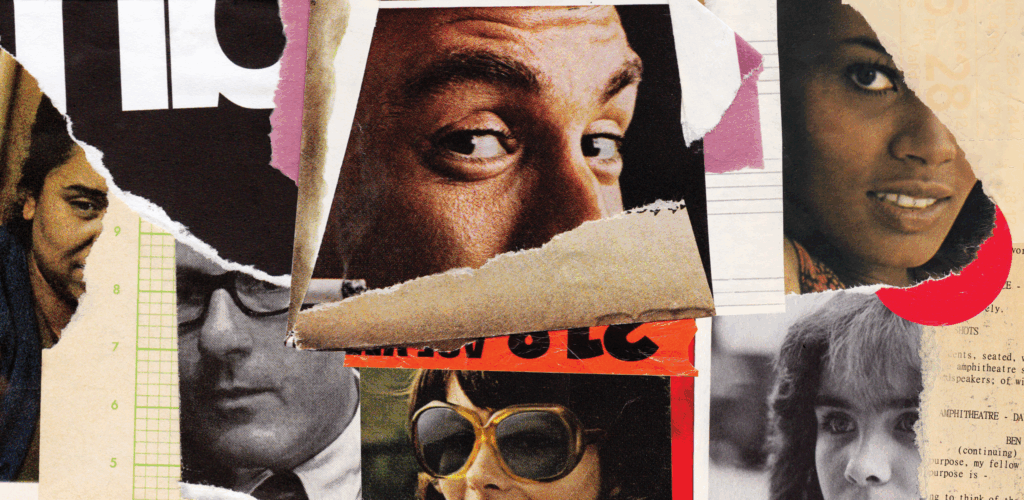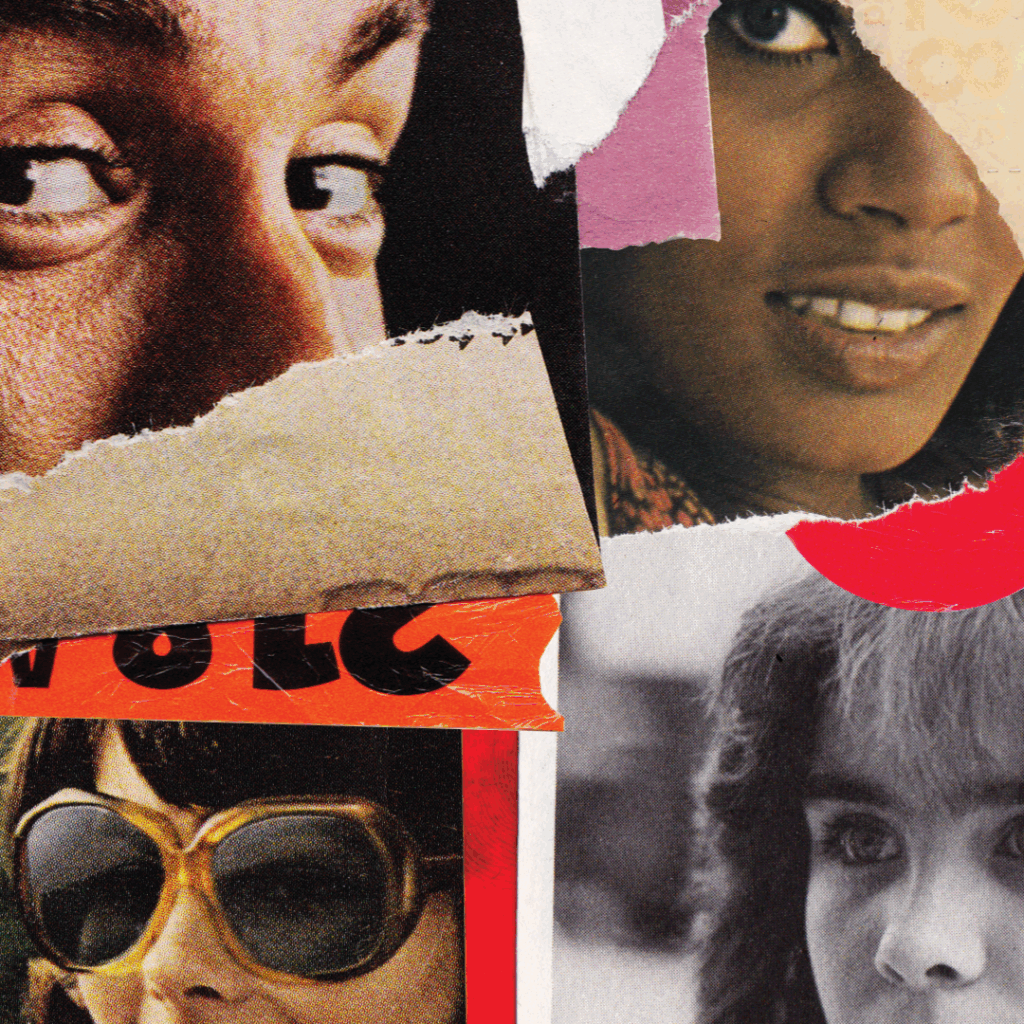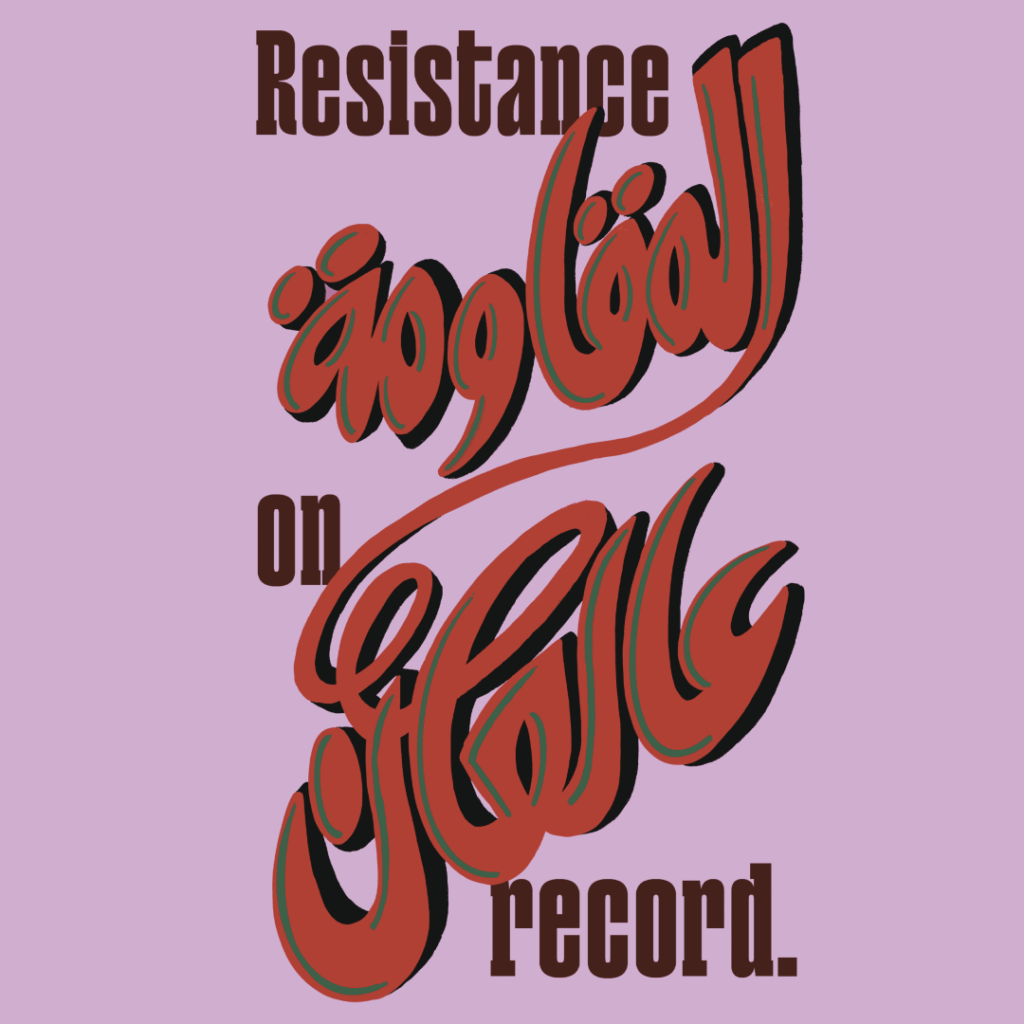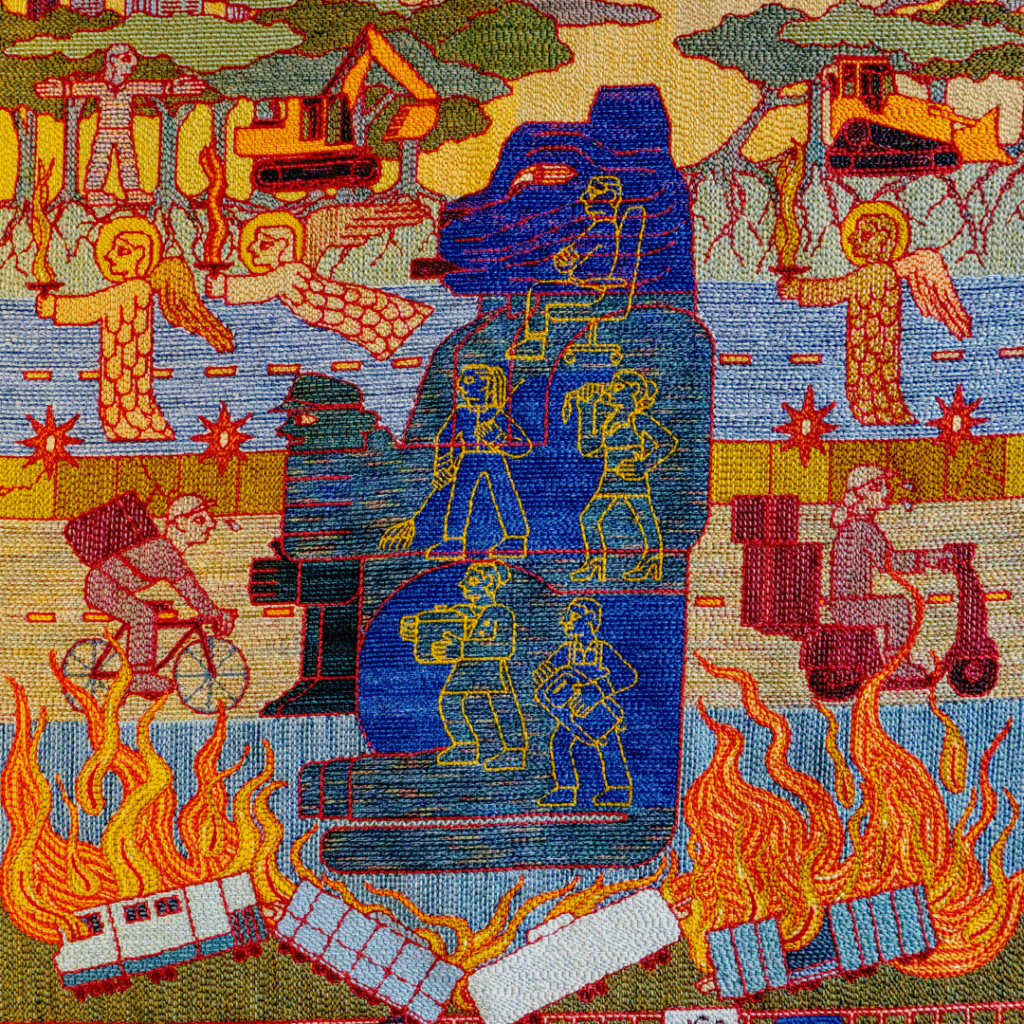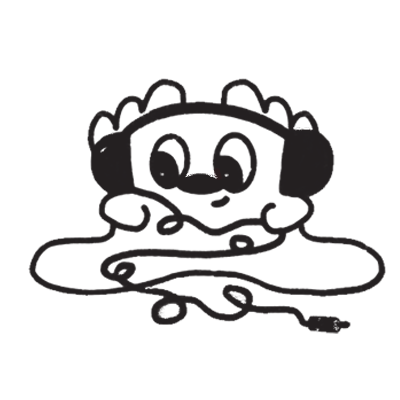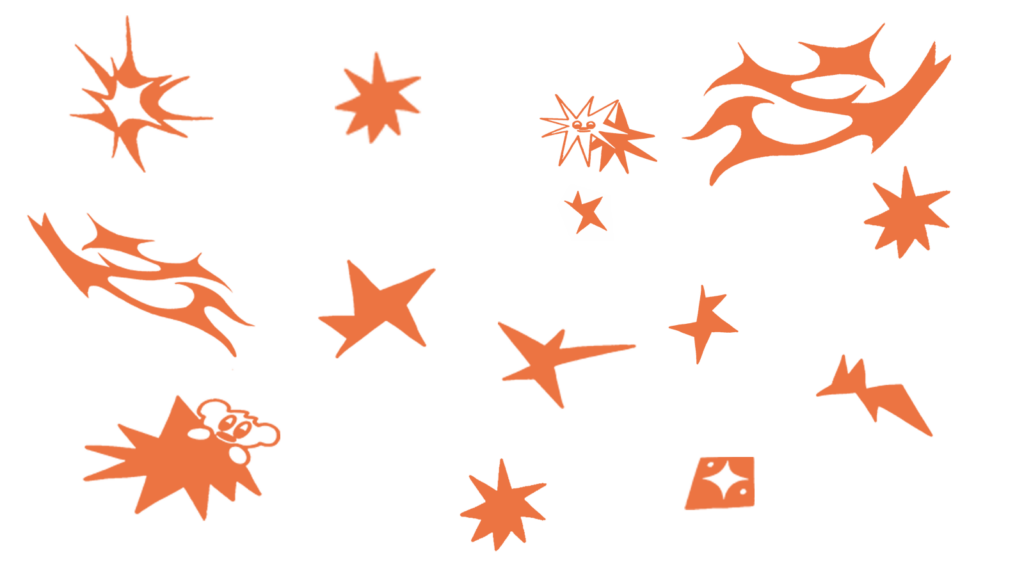Two Feet From Stardom
When we talk about celebrity in podcasting, the focus is always on the hosts, the talent. But like any kind of stardom, the stars are just the gravitational center; others orbit around them, sometimes glimmering in the background and even absorbing some of the fame. The podcast producer occupies every variation of this secondhand celebrity: wisecrack sidekick, ascendant talent, substitute host, silent scribe, or just a vaguely familiar name in the credits. Whether they seek it out or not, they may be drawn into public life, even if formally their role is to build fame for other people.
We wanted to know what it’s like to observe the role of celebrity—in their hosts, in the industry, and in themselves—from this unique vantage point. What are the benefits, challenges, and surprises of being on the border of podcast celebrity? To find out, we talked to ten producers working across formats and genres whose experience ranges from 16 months to 16 years. Their names and identifying information have been changed to allow them to speak candidly. After all, their celebrity hosts are often also their bosses.
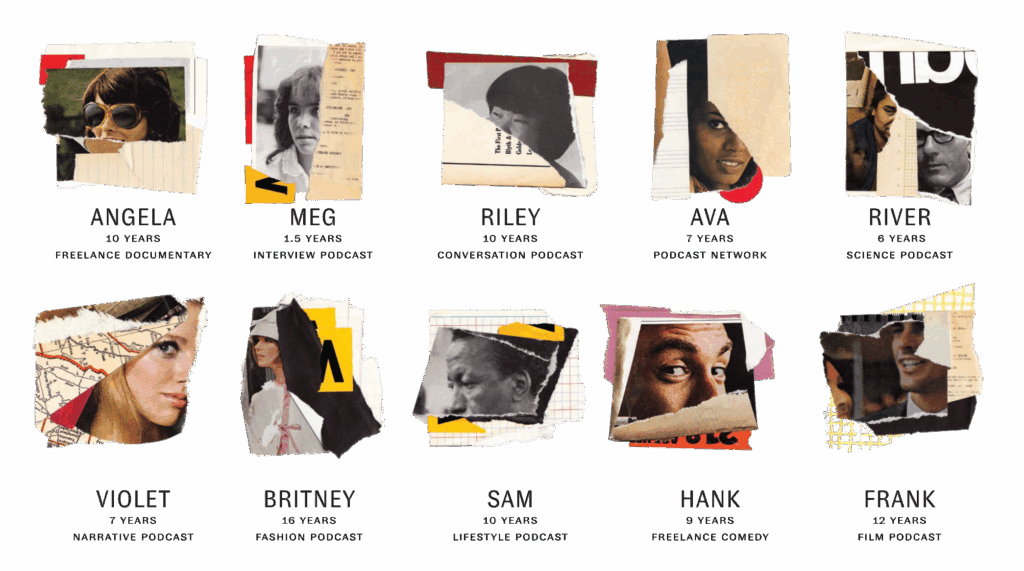
How have you experienced celebrity because of your role?
Riley: I pretty routinely get recognized on the street now. I’ve gotten to the point where I have to remind myself, “don’t have a bad day with strangers,” because you never know who they’ll be. I find the feeling of being on display really uncomfortable, and there’s this flattening of yourself and your persona that happens. You turn a little bit into a cartoon character of yourself.
Ava: My face isn’t really in anything, so I’m not being recognized in that way. But when I talk to people a bit they’ll realize they’ve heard me before, and that’ll happen mostly in social situations, like meeting people out at a bar. I feel like a position of status is put on me when people recognize me in this way. But I also feel like an outsider—I’m not a comedian, I’m not a podcaster. So my instinct is to be like, “No, it doesn’t matter. I’m not actually a part of this.”
River: To me, it’s like the perfect amount of celebrity. There’s been this fun thing where people from my past will sometimes hear an episode and out of the blue reach out; someone I haven’t talked to in like a decade or just knew for a moment. After the first episode, I even got a call from someone in Hollywood. This feels like such a small niche world I’m in, but it can lead to whole universes opening up.
Angela: As my work has moved away from broadcasts to the internet, I think the only people I have any kind of claim towards celebrity with is among other producers. I am contacted by strangers, but usually ones that want to make a podcast.
Meg: Once they started talking about me on the podcast, a lot of people followed me on Instagram, and people now message me. I think it’s a little strange because I don’t post about work at all online. Sure, you can see my dog, you can see my apartment, but you’re not going to get the inside scoop on the show. I think it’s sweet that people are that involved, but I don’t really think about it much.
Violet: I was at the gynecologist, fully in the stirrups with the little sheet over my legs, and the doctor asked where I worked. I told her and she was like, “Oh, what’s your name?” After I told her, she said my first and last name together in the voice of the host reading the credits. And it was clear through doing that she was recognizing who I was, which is really weird.
Sam: I don’t think any kind of celebrity has happened to me.
Frank: I have definitely experienced my own unique kind of spotlight. On the show, I kind of play a heightened version of myself, a kind of character; a lot of in-jokes, very specific bits. So when everyone is tagging me in posts about those bits, that’s funny and I do love and appreciate that. In person, though, I will get feedback where people are like, “I thought you were gonna be grittier. You’re more clean cut. You’re seemingly a nicer person. You’re less cartoonish.”
Hank: I’m fairly anonymous on the shows I work on. Maybe on mic a little bit, or maybe I’m mentioned or something, but nobody cares.
Britney: It does happen that people come up and they recognize me and they’re really sweet about it and I’m super amped, but it’s really rare and special. Sometimes people are like, “I didn’t want to bother you,” and I’m like, “No please, this made my day, it’s so exciting.” People do recognize me by my voice, too, and it’s always when I’m talking shit, when I’m being awful.
What’s it like having a podcast celebrity, or a celebrity podcaster, as a boss?
Ava: I have this working theory of tiers of celebrity, what that does to a personality, and how they work with people. The people at the bottom and at the top are both very nice, because the people at the bottom are so hungry, everything is still exciting for them, and people at the top learned that they need to be kind to people. And then the people in the middle who are really climbing for something and probably got some sense of celebrity kind of recently, it has shifted their relationship with themselves, sort of screwed up their sense of the world.
Angela: I was hired at a show where the hosts’ personalities and their dynamics were part of what brought listeners in, so they felt a level of care and caution I didn’t. But I also felt that there was an inflation of the stakes of the show, a prioritization of the show over the people around them, including their families and team. That culture made for a really unhealthy workplace.
Meg: My job is resting on one person’s reputation and fame; it’s weird to be professionally attached to someone’s public image.
Violet: I’m in the fortunate position of genuinely liking my boss, so I feel like I can speak positively about them when people ask. I do also feel a little protective because of the nature of celebrity; people really want to know bad things about public figures. I feel like I have to protect my boss’s reputation.
Did you anticipate fame or exposure to be part of producing?
River: It’s been such a weird journey because in college I had such trouble even speaking up in 12-person discussion classes. I think I’ve secretly always wanted to have a public voice but it was hard to feel like my ideas and voice were worthwhile. Making audio stories and seeing them touch people, you’re like, “Whoa that’s amazing, I made a thing and then someone I don’t even know feels big feelings.”
Meg: I thought I did initially, but once people started following me on Instagram, I realized I have very little interest in it. I just want to do my job well. I have no desire for anyone to know me this way. I see how challenging it is when people have constant opinions about your life.
Violet: I never aspired to be famous and didn’t think I’d make any money. Now, having been in the industry for a better part of a decade, I’m making more money than ever and my proximity to fame is much different than I ever imagined it would be. I still don’t really care about being famous but I do see some of the perks of it and the ego boost. Although more than a little fame seems horrible. My boss’s amount seems like the perfect level and does make me more interested in doing public-facing things.
Britney: No way. Back in my day, when I started working, it was for the radio. I thought I would be a producer for a host on the radio; I’ll just read books, make prep sheets and help some host. I was excited to be in proximity to fame for sure. But no.
How have you seen the hosts you work with relate to their own (increased) celebrity?
Riley: It is a type of power, and power can corrupt. I’ve seen hosts kind of become assholes when they become big deals.
Violet: They kind of ignore it or pretend it’s not really the case, even though we get emails from actual celebrities being like, “I love your show.” They’ll read those to us, because it’s kind of fun, but it’s very much treating other celebrities like they are the real celebrities.
Sam: I haven’t seen a change in them. I think they’re the same kind of host, the same kind of person.
Frank: Their banter has become entertainment. There are times where there’s a blur between real life and the entertainment. They’ve just become aware of how people want to hear what they’re saying, so it’s like, “Let’s just turn the mic on and not catch up with each other first; we’ll do it on mic.” There’s this awareness of persona.
Hank: Part of what I was proud of was that the show did expose my host to more people, and I think that their podcast fame is something they took really well and really enjoyed. I’ve seen versions of that happen before where comedians have been touring forever but then can reach more people by doing a podcast and then more people come to their shows as a result. But I’ve never seen anyone where it goes to their head and they become awful yet. But you never know.
Do you discuss fame, celebrity, and exposure in your workplace?
Riley: We do. We had really explicit conversations when the show started because we both knew it was going to be big. So we decided early on that whenever possible we would do press together. I shared my experience as a producer having a lot of the credit for my work eclipsed by a host. That happens more in a narrative show—a lot of times the hosts don’t write a single word that they’re reading. All of the writing, all of the reporting, is done by the producer. But because the host is reading it, it gets attributed to them. We’re really deliberate about how we message our positions and collaborators and my visibility especially.
River: I’ve never talked to anyone I worked with about this element of our jobs. And I wonder why we don’t. Maybe there’s something sensitive about it. Maybe one of the parts of the value system of this group is quite a bit of humility, so not wanting to come across like you’re showing off.
Angela: People are having this conversation constantly. Particularly at the production houses that are fighting to survive. Celebrity is viewed as a way to guarantee listeners and audience. That strategy has created a thin, flimsy, plasticky-feeling product and has resulted in a lot of people losing their jobs.
Violet: Honestly, not at all. That’s because my boss pretends they’re not famous, or just not in the work for that reason. Because I come from an old school shop where the mission and the work come first, the celebrity aspect is very much a weird consequence of the work and not the reason anyone is doing it. There’s an awareness that the show’s reputation helps us make good work, but how it’s talked about among colleagues is the role that celebrity plays is all in the service of the work.
Frank: Not formally. We’ve all had to be more careful about how we’re putting ourselves out there in the world in our personal lives. That’s been learned through particular experiences, small little moments that maybe had negative feedback.
How has your own relationship to and understanding of celebrity changed because of your experience as a producer?
Riley: I don’t necessarily want fame but I want credit. And that’s a really key distinction that’s very, very difficult to make. In our media economy, credit and fame are so linked together, and in the absence of changing the way that we think about visibility and credit and talent and labor in a creative economy, we have to play within the rules, at least for the time being. What that’s meant for me is going with the flow.
River: In some ways, even the people I work with were celebrities to me. I didn’t know what it took to be one of these people, and it felt like the distance was so incredibly large. As I’ve moved through my career, and now work with people I look up to, I realized it’s not so far away.
Angela: A lot of what makes people love celebrities can be attributed to the teams around them. The editorial choices being made, the wardrobe, what appearances they go to, how well they’re prepped. As a producer, I don’t really feel entitled to celebrities’ time. I’ve found the best results in collaboration when I treat them as humans who also have a lot of annoying dietary restrictions or can’t get their iPad to work. Producing with famous actors has shown me people just want to be treated like humans; they want privacy and they want connection, and that’s hard.
Meg: More than anything, everyone is trying their best to stay relevant all the time. The longer I’ve worked on the show, the less I care. I’ve disengaged more from celebrity culture in my own life, knowing how the sausage gets made. I used to be quite charmed by some interview shows, and I’m not anymore.
Britney: I’ve always said I just want to be famous enough for people to answer my emails—everyone must answer Rihanna’s emails—and so far that has yet to be true. How great would that be?
What question would you ask another podcast producer about celebrity?
Riley: What does credit look like to you beyond fame?
Ava: Is your personality honestly represented in your producorial, sometimes third-mic role, or are you putting on some sort of character?
River: Is there some little part of you that has always secretly wanted celebrity?
Meg: How much vacation do you get? What’s your work schedule like?
Violet: Has your evolution as a producer made you more of an ego monster?
Britney: Do you actually feel famous? And has it changed your life?
![]()
Stephen Lurie is a writer and facilitator living in Brooklyn. He can be found at stephenlurie.com.
